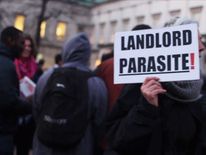It is the start of a new academic year at Goldsmiths, University of London, and first year students are moving into the Raymont Hall residences.
Student ambassador Shannon Howard is there to greet them with a smile. She is a second year PPE (Philosophy, Politics and Economics) student who spent nine months living in the same building.
During that time responsibility for the maintenance and upkeep of Raymont switched from the university to a private company, Campus Living Villages (CLV).
"It was such a lovely place to live," said Ms Howard. "Everybody was really nice, we had such lovely group of people that lived here."
For the past six months, Ms Howard and a number of Goldsmiths undergraduates have not paid their outstanding rent, either to the university or to CLV.
"I stopped paying rent because I wanted to make a statement about how unfair it is, and how exploitative it is to expect students to pay going on £170 a week for a room," said Ms Howard.
On Friday afternoon at a nearby community centre, she met up with other student activists as they prepared for a weekend workshop. The focus of the two-day event was going to be developing strategies for running successful rent strike campaigns at campuses across the UK.
The ultimate model for success for many of them was University College London (UCL), where around 1,000 people refused to pay rent for roughly five months and captured national headlines earlier in the year.
Jason Murugesu was one of the strike's chief negotiators. He and roughly 20 other activists worked to win concessions from the university's administration, including rent freezes, rent reductions and a £350,000 accommodation bursary for those with limited means.
"Especially in London you struggle so much just to afford to live," said Mr Murugesu, who is studying neuroscience at UCL.
"Students felt very much that this was the only way to force a situation."
Over the summer Mr Murugesu used a Freedom of Information request to find out about the comparative cost of his first-year rent.
UCL told him that that 20 years ago, an equivalent room to his own had cost just £57.75 per week. Five years later, it was £20 more expensive, and by 2006 it had jumped another £30. Now, rent for this academic year is set at over £177 per week.
Those numbers dramatically exceeded inflation - but so did the London property market.
George Spencer, CEO of Rentify - an online letting agent for private landlords, said: "The percentage increase of rent may seem like it's too high.
"We're seeing 40 and 50% increases in rent since 2010, but ultimately the rents are starting at a much, much lower level than they are in the private sector."
He added: "These are students who are unwilling to pay their rent, not unable to pay their rent. If they were unable to pay their rent then the market would correct itself, and we'd see more affordable accommodation built."
Over the summer holidays, the private sector - in the guise of her former landlord - has been pursuing Ms Howard, sending her letters, emails and leaving voicemails.
In one, the company contacting her wrote: "Your balance outstanding is £1,471.24 pence. We are a debt collection agency working on behalf of our client, Campus Living Villages UK Ltd. We have been instructed to collect the above amount, and we have sent you a letter to this effect."
CLV told Sky News that Ms Howard should not have received such a letter if she is formally registered by the university as a rent striker, as she claims to be.
In a statement, Goldsmiths wrote: "We use a six figure grant to subsidise rents and offer a range of prices to meet all budgets... for this academic year we've frozen prices on more than 100 of our cheapest rooms while there is a below-inflation rise for a further 400 rooms."
Ms Howard says such practical measures are welcome, but there has always been a principle at stake for her in these discussions.
"We should put people and people's welfare before profit, and I think the reason why we have decided to go on rent strike, and have been on rent strike, is because we believe that that hasn't been the case."
Both sides in the Goldsmiths dispute says they will continue to talk. Students at other universities across the country are likely to follow the conversation very closely.





